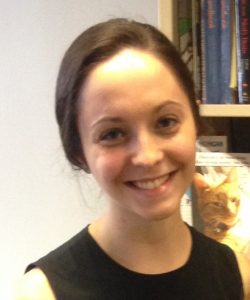 Hearing and Speech Sciences (Vanderbilt University)
Hearing and Speech Sciences (Vanderbilt University)
sarah.k.diehl@vanderbilt.edu
Background Information: I received my master’s degree in speech-language pathology at Duquesne University where I completed my thesis (Multimodal intervention for people with TBI) under Dr. Sarah Wallace and worked as a research and AAC lab assistant. During my time at Duquesne I became interested in AAC intervention for adults with TBI and other neurologically based disorders. As a current clinical fellow at Vanderbilt University Medical Center (VUMC), my interest in AAC research increased through my experiences working with patients in the interdisciplinary Huntington’s disease (HD), trauma, and other neurology and rehabilitation clinics. I found that a large portion of my patients travel far distances to receive services at VUMC, particularly those with HD seeking AAC services, as many clinicians at outside facilities were unable to meet their complex needs.
Current Interests: I work as part of an interdisciplinary team serving patients with Huntington’s disease (HD) as well as smaller roles with other neurodegenerative disorders (e.g., ALS, PSP, Parkinson’s disease, cerebellar atrophy). Many patients with HD have difficulty accessing services closer to home and travel to VUMC. My goals are to complete an ongoing speech perceptual characteristics project examining the profiles of speech deficits among these patients. My next step will be to further characterize AAC use and communication partner training in relationship to the patients with HD’s cognitive-linguistic and motor profiles. In addition, I assess and treat people who sustained TBIs and hope to continue my work examining the relationship between cognition, language, and AAC implementation with this population in the future.
Sample Presentation/Publication: Diehl, S.K., Wallace, S.E., Kinney, J., & Staltari, C. (November, 2016). Integrated multimodal communication treatment for severe traumatic brain injury. Paper presented at the American Speech-Language-Hearing Association Annual National Convention, Philadelphia, PA.
Dissertation Chair: Dr. Michael de Riesthal
Think Tank Presentation Topic
I am interested in developing an evidence-based framework to guide evaluation and implementation of communication services, including Augmentative and Alternative Communication (AAC), for people diagnosed with Huntington’s disease (HD). HD is a progressive neurological disorder characterized by gradual motor, cognitive, and psychiatric decline which eventually impacts participation in communication activities. Life expectancy following the onset of HD symptoms is approximately 15-17years, and communication may be impaired for much of this time. At VUMC, patients from across Tennessee and surrounding states travel to the HD Clinic for medical and rehabilitation management as it can be very difficult to find outpatient services for this population. The literature describing AAC use with people with HD is limited. To our knowledge, one case study has been published describing linguistic and cognitive supplementation strategies as AAC techniques in HD (Klasner & Yorkston, 2001). This study highlights only one patient and although beneficial strategies are identified this may not be the most appropriate AAC system for all people with HD. Within the clinic, we have observed patients who benefit from a range of strategies depending upon their level of cognitive, motor, and speech/voice deficits (e.g., eye gaze, communication books, picture boards, typing messages through texts, iPad applications).
In my future research, I would like to better characterize the AAC needs and abilities of people with HD. For example, it would be beneficial to investigate the types of AAC strategies people with HD can successfully access across the disease continuum. This would help to identify the shifting communication needs of people with HD as the disease progresses. In addition, examining correlations between recommended devices and various profiles of cognitive-linguistic and motor deficits may lead to a framework for selecting appropriate strategies to trial with similar patients with HD.
Discussion Starters
- What steps might need to be taken prior to completing a project such as this? Try to publish additional case studies?
- How do we define successful access of strategies and how we bridge the gap from evaluation to treatment?
- How do we determine how many participants should be included in something like this?
- What else might be done to improve recognition of the need for communication services for people with HD? How might this be used to improve professionals’ ability to serve this population?
Comments are closed.